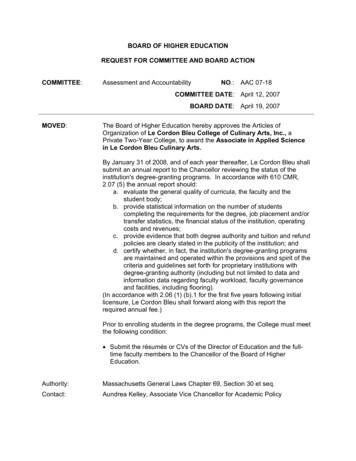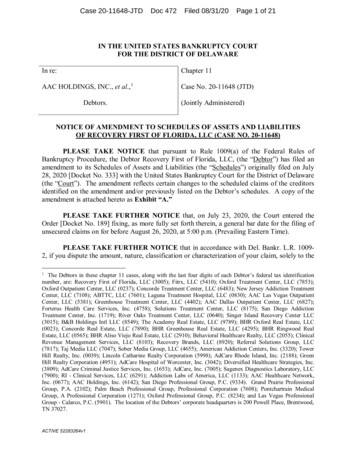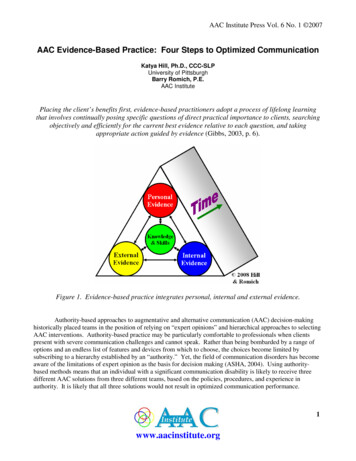
Transcription
BOARD OF HIGHER EDUCATIONREQUEST FOR COMMITTEE AND BOARD ACTIONCOMMITTEE:Assessment and AccountabilityNO.: AAC 07-18COMMITTEE DATE: April 12, 2007BOARD DATE: April 19, 2007MOVED:The Board of Higher Education hereby approves the Articles ofOrganization of Le Cordon Bleu College of Culinary Arts, Inc., aPrivate Two-Year College, to award the Associate in Applied Sciencein Le Cordon Bleu Culinary Arts.By January 31 of 2008, and of each year thereafter, Le Cordon Bleu shallsubmit an annual report to the Chancellor reviewing the status of theinstitution's degree-granting programs. In accordance with 610 CMR,2.07 (5) the annual report should:a. evaluate the general quality of curricula, the faculty and thestudent body;b. provide statistical information on the number of studentscompleting the requirements for the degree, job placement and/ortransfer statistics, the financial status of the institution, operatingcosts and revenues;c. provide evidence that both degree authority and tuition and refundpolicies are clearly stated in the publicity of the institution; andd. certify whether, in fact, the institution's degree-granting programsare maintained and operated within the provisions and spirit of thecriteria and guidelines set forth for proprietary institutions withdegree-granting authority (including but not limited to data andinformation data regarding faculty workload, faculty governanceand facilities, including flooring).(In accordance with 2.06 (1) (b).1 for the first five years following initiallicensure, Le Cordon Bleu shall forward along with this report therequired annual fee.)Prior to enrolling students in the degree programs, the College must meetthe following condition: Submit the résumés or CVs of the Director of Education and the fulltime faculty members to the Chancellor of the Board of HigherEducation.Authority:Massachusetts General Laws Chapter 69, Section 30 et seq.Contact:Aundrea Kelley, Associate Vice Chancellor for Academic Policy
BOARD OF HIGHER EDUCATIONApril 2007Le Cordon Bleu College of Culinary Arts, Inc., A Private Two-Year CollegeAssociate in Applied Science in Le Cordon Bleu Culinary ArtsINTENTIn May 2005, Le Cordon Bleu College of Culinary Arts, Inc., A Private Two-Year College, filed acompleted petition to establish a private two-year college in Massachusetts and offer theAssociate in Applied Science in Le Cordon Bleu Culinary Arts. The College’s mission is toprovide educational programs that prepare students for professional opportunities and careersuccess in the international culinary industry by providing an individualized, hands-on educationin the classic and modern culinary arts. The degree in Le Cordon Bleu Culinary Arts wasdeveloped in response to student interest and industry demands and aims to provide thetheoretical foundation and technical skills necessary for success in the food service industry.Graduates are expected to have gained the background and expertise necessary to enter thefood service industry in entry- to mid-level positions and to advance through a variety of relatedpositions. Program graduates should be prepared to assume such positions as cook,apprentice chef, food and beverage manager, or kitchen manager in settings such asrestaurants, hotels, schools, bakeries, resorts, and cruise ships.LEADERSHIP, ADMINISTRATION, AND GOVERNANCELe Cordon Bleu is part of the Career Education Corporation family of institutions. In fall 2006CEC-owned institutions enrolled 102,984 students worldwide, including 92,190 full-time and10,794 part time students at 79 domestic (including three online) and14 international institutions.Within the CEC family a range of programs are offered, including doctoral, master,baccalaureate, and associate degrees, as well as diploma and certificate programs. The CECculinary arts division currently comprises 12 campuses.The administration and governance of the proposed Massachusetts campus is structured toinclude a board of trustees; a local administrative team led by the president; linkage betweenthe branch campus and the main campus in Pittsburgh, and corporate managerial oversight.Le Cordon Bleu provided two organizational charts to depict the local organization of the branchcampus and the operational linkage between the main and branch campuses. The first chart,entitled Le Cordon Bleu College of Culinary Arts, Inc., A Private, Two-Year College, presentsthe proposed organization of the branch campus.In Massachusetts, the operating authority for the College tracks through Le Cordon BleuCollege of Culinary Arts, Inc., a subsidiary established to comply with the Massachusetts Boardof Higher Education requirement that a college in Massachusetts have degree-granting authorityin its state of charter origin. Since Le Cordon Bleu College of Culinary Arts, Inc., BostonCampus, will receive its degree-granting authority from the Massachusetts Board of HigherEducation, a Massachusetts subsidiary was required. The Massachusetts subsidiary is whollyowned by the Pennsylvania subsidiary, which is ultimately wholly owned by Career EducationCorporation (CEC).1
The Massachusetts Board of Higher Education requires that a college have a formal board oftrustees. The board of trustees is shown on the chart immediately above the box showing theposition of President.The second chart, entitled Main-Branch Ownership and Operational Linkage, highlights the keypoints of responsibility between the Pennsylvania Culinary Institute (the main school) and theBoston Campus of Le Cordon Bleu College of Culinary Arts, Inc. (the branch school). At theownership level, the two schools have a common corporate owner—Career EducationCorporation (CEC)—the parent company. At the operating level, the two schools share acommon operating subsidiary—Le Cordon Bleu Institute of Culinary Arts, Inc. (PA). Theoperating authority of Le Cordon Bleu Institute of Culinary Arts, Inc. (PA), for the main school,Pennsylvania Culinary Institute, is direct. Pennsylvania law permits the use of d/b/a names;therefore, Le Cordon Bleu Institute of Culinary Arts, Inc., operates in Pennsylvania under theinstitution’s historic name—Pennsylvania Culinary Institute. Many main campus/branch campusrelationships currently exist within the CEC family of schools. Each main/branch relationship ismonitored; and if workload at a main campus is seen to rise significantly as a result of thebranch campus(es), the main school is authorized to add an employee dedicated to the workbrought about by the branch campus.The parent corporation (CEC) will provide broad information technology support through itsCampus2000 (C2K) institutional data system. C2K provides for all student and academicrecordkeeping and contains an array of reports covering marketing and recruitment efforts,enrollment statistics, academic progress, graduation statistics, placement statistics, andfinancial reports that assist with governance and administration on the local, divisional, andcorporate levels. Financial aid processing is also handled centrally by CEC.Another area of linkage is through the student services and career services staff at the twocampuses, including the provision of placement assistance to students and graduates as theypursue employment opportunities. The Vice President of Student Services from the maincampus will mentor the student and career services officers from the Le Cordon Bleu campus inBoston. Student services and career services officers will also receive assistance throughtraining, online job fairs, and other support from the corporate Career Services Office.2
3
4
ACADEMIC AND RELATED MATTERSAdmissions Candidates for admission must have earned a high school diploma or itsequivalent prior to matriculation to the Institute. In addition to the admissions application,applicants must submit high school transcripts, a 100 application fee, and a signed enrollmentagreement. The College aims to admit students who demonstrate an intense desire andcommitment to become a professional chef and/or leader in the food industry. Students areexpected to show a high degree of motivation and ambition, a positive attitude, love of cooking,and an energetic approach. To assist the College in making this determination, all applicantsare required to complete a personal interview with an admissions representative, either inperson or by telephone, depending upon the distance from the school. The personal interviewalso enables school administrators to convey the demands of the career, including the physical,intellectual, and artistic requirements needed for success.Assessment and Placement Le Cordon Bleu assesses incoming students in readingcomprehension, writing, and math to determine their readiness for college-level courseworkusing Accuplacer and Writeplacer. Students may be exempted from some parts of theassessment based on their ACT or SAT scores. Tutorial services will include both facultytutoring and peer tutoring where appropriate.Tuition Tuition for the proposed associate in arts program is 35,000. Additional fees comprisethe 100 application fee; a graduation fee of 200; and an estimated 3,000 for textbooks,uniform, and equipment.Enrollment In fall 2006 CEC-owned institutions enrolled 102,984 students worldwide, including92,190 full-time and 10,794 part time students at 79 domestic (including three online) and 14international institutions. Of the 93 total CEC institutions, there are 12 within the culinarydivision with enrollments as follows.Fall 2006 Enrollment at All CEC-Owned InstitutionsFull-time Students92,190Part-time Students10,794Total102,984Culinary Division Enrollment: Fall 2006California Culinary AcademyCalifornia School of Culinary ArtsLe Cordon Bleu College of Culinary Arts AtlantaLe Cordon Bleu College of Culinary Arts Las VegasLe Cordon Bleu College of Culinary Arts MiamiLe Cordon Bleu College of Culinary Arts Minneapolis/St. PaulOrlando Culinary AcademyPennsylvania Culinary InstituteScottsdale Culinary InstituteTexas Culinary AcademyThe Cooking and Hospitality Institute of ChicagoWestern Culinary 7618059,731The following list indicates the estimated enrollment for each student cohort from the initialgroup through the first graduation fifteen months later. The total estimated enrollment is 765students—from the initial cohort through the first graduation from the proposed Boston campus.5
The college plans to start a new cohort roughly every six weeks. Typically, a new cohort willstart during the months of October, November, January, February, April, May, July and August. Cohort 1Cohort 2Cohort 3Cohort 4Cohort 5Cohort 6Cohort 7Cohort 8Cohort 9Cohort 10Cohort 1160 Students65 Students60 Students65 Students60 Students70 Students65 Students85 Students75 Students85 Students75 StudentsCurriculum (Attachment B) The proposed culinary arts curriculum was developed in partnershipwith Le Cordon Bleu Paris and comprises 22 courses delivered five hours per day, five days aweek over a twelve-month period plus a three-month externship. The Associate in AppliedScience in Le Cordon Bleu Culinary Arts requires the successful completion of 66 semesterhours of credit earned in the required coursework and a cumulative grade point average(CGPA) of 2.0 or better on a 4.0 scale. Fifty semester hours of credit must be completed inresidency at the College. The proposed program will be 60 instructional weeks in length with16.5 semester hours of general education course work and the balance of 49.5 semester hoursin required culinary concentration courses, including a twelve-week externship.The proposed curriculum is competency-based, and the 450 specific culinary proficiencies arethe same as those required at Le Cordon Bleu - Paris. As part of the program, students willlearn classical cooking methods and the qualitative aspects of food preparation, includingnutrition and sanitation. Laboratory sessions enable students to achieve proficiency by meetingthe standards established by the curriculum and defined by experienced chef instructors.Students progress to preparing food in quantity and become involved in both the front and backof the house operations in an on-site restaurant. Emphasis is placed on timeliness, procedure,and organizational techniques, as well as on product quality. The curriculum allows students tolearn about restaurant operations from a corporate level and then break down the variouscomponents to study in detail how they can be applied to any food service establishment.Students also study management theory, including the role of effective leadership in influencingtheir work environment.RESOURCESFiscal Resources and Budget (Attachment C)CEC will allocate corporate funding to cover real estate construction and related costs,equipment, initial personnel, and initial marketing and recruitment efforts. An operational budgetfor a new CEC branch campus typically projects that the campus will reach breakeven in thesecond year of operation. All deficits in the early months of operation of the proposed Bostoncampus are to be covered through corporate funding. A letter of corporate support from theVice President of Finance for the Start-up Division and a four-year budget projection for theCollege are contained in Attachment C.Faculty To lessen the burden on the proposed new branch campus, the CEC Start-Up Divisionwill assign a start-up team to provide initial oversight and training to staff members. TheDirector of Education will be hired approximately four to six months prior to the proposed start of6
classes and will have the responsibility of identifying a qualified faculty with sufficient membersto carry out all proposed instruction. Appropriately qualified faculty members will be identifiedwell before the start of classes and would typically be placed on contract approximately twomonths prior to the start of classes to provide an opportunity for orientation and training.Faculty at Le Cordon Bleu College of Culinary Arts, Inc., in Boston will participate in thegovernance process through the Faculty Council established by local campus faculty. CareerEducation corporation faculty and staff members receive professional development throughcorporately provided training, membership in professional associations, and throughparticipation in accreditation-related workshops.Library and Information Services Library resources for Le Cordon Bleu College of Culinary Artswill comprise a staffed on-site library and an electronic library. A Core Library Collection forculinary campuses has been developed by the CEC Corporate Librarian to include basic studiesand culinary arts collections that include audiovisual resources and standard books. In additionto the on-site Core Library Collection, Career Education Corporation provides an Internet-based,electronic library known as the CECybrary. The CECybrary is available to all students, faculty,and staff members of all CEC-owned institutions. This “virtual library” contains a collection offull-text journals, books, and reference materials, links to Web sites relevant to each curriculararea, and instructional guides for using electronic library resources. A full-time librarian locatedat corporate headquarters manages the CECybrary, and librarians at local CEC collegesparticipate in selecting the electronic resources and Web site links, and help prepare theinstructional materials that are on the Web site.Facilities and Equipment The proposed culinary arts campus is about 60,000 square feet insize. Forty thousand square feet are dedicated to instructional kitchens and classroom space,required dry and cold storage areas, and administrative and faculty office space. A 20,000square foot space is allocated to a full-service, fine dining restaurant that is open to the public.The kitchens are designed for various functions—demonstration, skills development,introductory and advanced baking, meat and seafood fabrication, introductory and advancedgarde manger, and the restaurant kitchen.The proposed Boston area campus will also include lecture-style classrooms and computerlabs, bookstore, student lounge, and administrative offices. The proposed location of Le CordonBleu College in Massachusetts is 215 First St., Cambridge, Massachusetts, where the Collegehas leased space on the third and fourth floors. Le Cordon Bleu’s proposal contained a copy ofthe lease, along with architectural drawings depicting floor plans and space allocation, as wellas equipment lists indicating the various types and brands for the kitchen/culinary related labs,computer lab, classroom, library, and other types of instructional equipment to be usedthroughout the facility.EXTERNAL REVIEWJames Ostrow (team chair), Vice President for Academic Affairs and Professor of Sociology,Lasell College; Susan Sykes Hendee, Ph.D., CCE, Associate Professor, New York Institute ofTechnology, Center for Hospitality and Culinary Art; Kristine Ricker Choleva, Chair, Hospitalityand Culinary Arts, Holyoke Community College; and Mark Andrews, Vice President ofAdministration, Northern Essex Community College, comprised the team of evaluators whovisited Le Cordon Bleu College August 1-4, 2005. As the Massachusetts institution was not yetestablished, CEC requested that the team visit the Le Cordon Bleu campus in Nevada.The Visiting Team commended the sound educational mission, organization of personnel, wellstructured curricula, competent and committed faculty, student satisfaction, solid financial7
foundation and planning, well maintained facilities and impressive library resources. The teamalso made several suggestions and recommendations, among them the need to:o establish an independent trustee board for the Le Cordon Bleu Massachusettsinstitution and clarify proposed roles and relationships with the national corporateoffice and Pennsylvania campus,o make the finalization of an appropriate faculty governance structure a priority followingapprovalo add culinary-specific software to campus lab computerso introduce remedial coursework into its programmingo enhance general education course offerings to meet Board requirements, ando ensure industry standard flooring safe material for kitchens (terra cotta tile)Le Cordon Bleu submitted a detailed response that identified the many actions taken andplanned to address recommendations and suggestions contained in the team report. Amongthe measures taken, the College hado established a local board of trustees with four of the seven members not affiliated withCEC or the institution and depicted and defined local, inter-institutional and nationalroles and relationships. A list of Trustees is in Attachment E.o described plans for faculty participation in governance, including establishment ofsuch groups as the faculty council and faculty curriculum committeeo listed the titles of culinary-specific software to be loaded onto Boston campuscomputer labso added to its curriculum offerings non-credit remedial courses in English andmathematicso increased general education offerings to meet the credit and distribution requirementsof 610 CMR, ando affirmed the institution’s plans to install appropriate flooring as recommended by theteam.After reviewing the Le Cordon Bleu Institutional response to the team report, the visiting teamrecommended that the Le Cordon Bleu petition be granted approval.PUBLIC HEARINGThe required public hearing was held on November 28, 2005, at 10 a.m. in the Board of HigherEducation’s office. Although no comments were offered in opposition to the proposed program,the ownership corporation, Career Education Corporation, was under growth restrictions,pending a U.S. Department of Education investigation concerning CEC’s administration of itsTitle IV programs. The U.S. Department of Education lifted these restrictions in January 2007.See Appendix D for a copy of the January 19, 2007, U.S. Department of Education letter toCEC.STAFF ANALYSIS
The Cooking and Hospitality Institute of Chicago 761 Western Culinary Institute 805 Total 9,731 The following list indicates the estimated enrollment for each student cohort from the initial group through the first graduation fi











